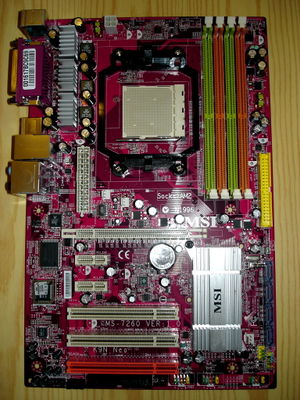Board:msi/ms7260: Difference between revisions
(Initial status report for the K9N Neo.) |
(Build instructions and TODO list.) |
||
| Line 80: | Line 80: | ||
| — | | — | ||
|} | |} | ||
== Building LinuxBIOS == | |||
Build a LinuxBIOS [[Payloads|payload]], e.g. [[FILO]], and copy the resulting file to /tmp/filo.elf. | |||
$ cp payload.file /tmp/filo.elf | |||
Checkout LinuxBIOS: | |||
$ svn co svn://linuxbios.org/repos/trunk/LinuxBIOSv2 | |||
Build the LinuxBIOS image, containing the payload. | |||
$ cd LinuxBIOSv2/targets | |||
$ ./buildtarget msi/ms7260 | |||
$ cd msi/ms7260/ms7260 | |||
$ make | |||
Write the LinuxBIOS image onto your ROM chip using [[flashrom]]: | |||
$ flashrom -wv linuxbios.rom | |||
<div style="color: red">WARNING: This will overwrite your current BIOS! Make sure you know what you're doing! You should have a way to revert back to the original BIOS in case anything goes wrong. It's a good idea to have a spare ROM chip which contains the original proprietary BIOS. Read the [[FAQ]] for more information. If in doubt, contact the [[Mailinglist|mailing list]].</div> | |||
Note: At the moment flashrom does ''not'' work in the MS-7260 (when booted using the original BIOS). Thus, I'm flashing the ROM chip in a different mainboard where flashrom works. However, flashrom works just fine once the MS-7260 is booted using LinuxBIOS. | |||
== TODO == | |||
* Test the devices marked as "Untested" in the above status table. | |||
* Fix flashrom to also work when the board is booted using the proprietary BIOS. | |||
* Fix the issues with PCI add-on cards. | |||
{{GPL}} | {{GPL}} | ||
Revision as of 20:21, 19 September 2007

This page describes how to use LinuxBIOS on the MSI MS-7260 (K9N Neo) mainboard.
The mainboard
So far we have verified that revision 1.0 of the mainboard has a socketed PLCC32 ROM chip (512KB).
If you have any other revision of the board, please contact us on the mailing list and let us know if it has a socketed (and PLCC-type) ROM chip.
Status
The respective patch is not yet committed, but it's available in the mailing list archives.
| Device/functionality | Status | Comments |
|---|---|---|
| CPU | Works | I'm using an AMD Athlon 64 X2 Dual Core Processor 3600+, both cores work fine. |
| RAM | Works | It seems some combinations of DIMMs and RAM slots don't work. Using only one DIMM works for me. |
| IDE | Works | — |
| SATA | Untested | — |
| USB | Works | — |
| On-board Ethernet | Works | — |
| On-board Audio | Works | — |
| PCI add-on cards | Not working | There seems to be problems with PCI add-on cards. This is being investigated. |
| PCI-E add-on cards | Untested | — |
| Floppy | Untested | — |
| Serial port (COM1) | Works | — |
| Parallel port | Untested | — |
| PS/2 keyboard | Untested | — |
| PS/2 mouse | Untested | — |
| Mainboard sensors | Untested | — |
Building LinuxBIOS
Build a LinuxBIOS payload, e.g. FILO, and copy the resulting file to /tmp/filo.elf.
$ cp payload.file /tmp/filo.elf
Checkout LinuxBIOS:
$ svn co svn://linuxbios.org/repos/trunk/LinuxBIOSv2
Build the LinuxBIOS image, containing the payload.
$ cd LinuxBIOSv2/targets $ ./buildtarget msi/ms7260 $ cd msi/ms7260/ms7260 $ make
Write the LinuxBIOS image onto your ROM chip using flashrom:
$ flashrom -wv linuxbios.rom
Note: At the moment flashrom does not work in the MS-7260 (when booted using the original BIOS). Thus, I'm flashing the ROM chip in a different mainboard where flashrom works. However, flashrom works just fine once the MS-7260 is booted using LinuxBIOS.
TODO
- Test the devices marked as "Untested" in the above status table.
- Fix flashrom to also work when the board is booted using the proprietary BIOS.
- Fix the issues with PCI add-on cards.

|
This work is free software; you can redistribute it and/or modify it under the terms of the GNU General Public License as published by the Free Software Foundation; either version 2 of the License, or any later version. This work is distributed in the hope that it will be useful, but WITHOUT ANY WARRANTY; without even the implied warranty of MERCHANTABILITY or FITNESS FOR A PARTICULAR PURPOSE. See the GNU General Public License for more details. |